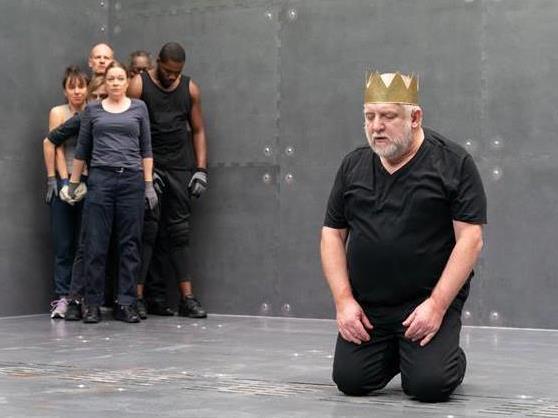Simon Russell Beale and the company. Photo by Marc Brenner.
Joe Hill-Gibbins directs an abridged version of The Tragedy of King Richard II for the Almeida Theatre in London. Calling the play by its full name, instead of simply ‘Richard II’ reminds us that what we’re about to see comprises more than entertainment. Reviews of productions of Shakespeare always say how relevant the story is to today, how telling are the themes for modern times, how universal are the observations … This review is going to do that, too. Into this pared-back presentation of the fall of a king we can read Trumpian lies and machinations, issues of toxic masculinity, assumptions of entitlement, even the Brexit shemozzle (harder to follow than the densest Shakespearean text).
King Richard, portrayed in extreme close-up by Simon Russell Beale, is a monster, and he gets his comeuppance. Beale is often referred to as the UK’s greatest Shakespearean actor so his excellence here isn’t surprising. We get the monster and the human. This production opens and closes with same speech from Act 5, scene five: Richard wondering who or what he is if not king. The lines include a rhythmical rhyming reflection on not-being – ‘With nothing shall be pleased till he be eased / With being nothing’.
Leo Bill as usurper Bolingbroke inhabits ambivalence and impulsiveness; the moment where he hesitates to crown himself is a stand-out. Saskia Reeves plays three characters (Mowbray, Bushy Green and the Duchess of York) – when you’ve gotten rid of costumes and all the actors are in dark monotones, the usual clue to changes of character are gone, so being able to tell immediately when she shifts from one character to another is testament to her skills. She’s compelling throughout.
It’s redundant nowadays to note that the production is cast colour/gender blind. Characters are characters. Joseph Mydell does a double turn as Gaunt and Willoughby, and Martins Imhangbe plays both Bagot and Aumerle; he and Natalie Klamar as Carlisle are both arresting. John McKay plays York and Northumberland is given an almost comical mien by Robyn Weaver.
The play is set in one grey walled room with no exits or windows. Rivets in the walls remind us of the process of construction. The actors are in contemporary casual wear, and apart from buckets, there are no props. There are surprises, using the most basic theatrical devices. Sound consists of one faint drumbeat underneath the action.
All we get are bodies in a confined space; there’s no grand staging spectacle to distract you. You are forced to concentrate much harder than usual on the language to keep up.
This visceral, physical production enjoys exquisite ensemble work and beautiful choreography. The whole cast is on stage the whole time, yet we experience a range of illusions, from a crowd to one character in solitary confinement. Body language works like a spoken tongue, physicality competing with words.
Not only has the play been pared back physically, the abridgement of the text moves the story swiftly to the rebellion on the part of the nobles and ensuing events. We’re done after nearly two hours with no interval. Lighter moments include the tossing down of gauntlets, highly stylised, and outbreaks of scuffles.
Hill-Gibbins is famous for doing unconventional things with his productions of Shakespeare, but this is not a pretentious or gimmicky production, it is affecting, with intimate and nuanced performances. We don’t seem to tire of stories about a corrupt leader who’s acted with impunity in the pursuit of glory coming undone by bad decisions and his own ego. The story contains an implicit critique of social structures, of authority, of entitlement, of masculinity. A monarch rules by virtue of being crowned only. A man is the sum of his deeds.
4 stars ★★★★
The Tragedy of King Richard II
By William Shakespeare
National Theatre Live
Directed by Joe Hill-Gibbins
An Almeida Theatre production
In cinemas from 20 April 2019





